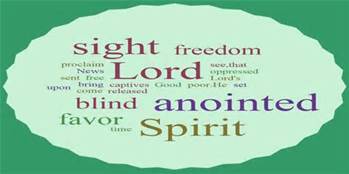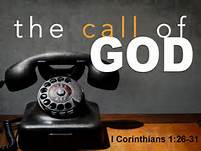“Proclaim the Gospel!”

Luke 4:14-21 – June 26, 2016
The primary season is over. You all know what that means. The presidential primaries have been going on for months, and they are finally over. Some people in the United States have followed the debates, listened to the various candidates, and discussed the various political positions, pro and con. What’s more, we are also going to elect congressional representatives, and state and local officials, too. Campaigning will begin in earnest this fall.
All of this campaigning has a purpose. The various candidates all try to have their position distilled down to a simple message. What they stand for. What they will strive to do.
I want us to look at the Gospel passage for today, from Luke. This is the very beginning of the public ministry of Rabbi Jesus. We can draw some parallels between this passage and the political campaign going on in our country, right now.
Sure, this was the very beginning. Jesus was just starting to make a name for Himself as an itinerant rabbi. And, He came to His hometown, the place where He grew up. Maybe where the butcher and baker down the street were good friends with His parents from way back. Maybe the real estate agent across the square sold His parents their house some years before, the house where His mother Mary still lives. In other words—I suspect everyone in that village was there in the synagogue that day to hear what the Rabbi Jesus—their hometown boy!—had to say.
Jesus already had generated some buzz in the greater Nazareth area. “Have you heard the latest about that Jesus? The one who says He is a Rabbi? The one who was baptized in the River Jordan by that Baptizer fellow? And, there was something about the heavens cracking open, a dove flying out of a clear blue sky—and a voice from heaven! I’m not saying all this was for real or not, but that is what people are saying about this Jesus. You know, the guy from our town.”
Jesus had hardly started to do His public ministry, and people were already talking about Him and what had happened in His life. Even in Nazareth, the town where He had grown up.
I am fascinated by this particular reading, where Jesus preaches His first sermon. It is quite a bit like political campaigns. The various candidates all try to have their position distilled down to a simple message. What they stand for. What they will strive to do. Just so, with Jesus.
Let’s read from our passage from the Gospel of Luke, again. “Jesus stood up to read, 17 and the scroll of the prophet Isaiah was handed to him. Unrolling it, He found the place where it is written: 18 ‘The Spirit of the Lord is on me, because he has anointed me to proclaim good news to the poor. He has sent me to proclaim freedom for the prisoners and recovery of sight for the blind, to set the oppressed free, 19 to proclaim the year of the Lord’s favor.’”
There we have it. Jesus distilled His message down. His position, what He stands for, and what He will strive to do. Jesus is here to proclaim good news. Or, in the word from middle English, God-spell. What we today know as Gospel. Proclaim the good news, indeed!
This is what we are told in the sentence for this week from the United Church of Christ’s Statement of Mission. “Empowered by the Holy Spirit, we are called and commit ourselves: To proclaim the Gospel of Jesus Christ in our suffering world.”
If we say this passage from Luke is Jesus’s basic position statement for His overall ministry, how does that work for us? Jesus said He would proclaim: 1) good news to the poor, 2) freedom for the prisoners, 3) recovery of sight for the blind, and 4) to set the oppressed free.
My first thought is, I’m not poor! Or, a prisoner, or blind, or oppressed, either. I am not any of those things. What kind of stuff is Jesus saying here?
I live a fairly comfortable life in a small condo in Evanston. Seriously, what is Jesus bringing up? Does He have some kind of secret message? If these are the types of people Jesus says He is going to preach and minister to, I am not sure I would be comfortable with it. All that talk about the poor and blind, grief-stricken and oppressed, that is giving me some hesitation about following this new Rabbi Jesus.
But, let’s take a closer, deeper look. Here Jesus is addressing the poor. Could that be the poor in spirit, as well as poor, materially speaking? Next up, He addresses the prisoners. Perhaps, prisoners of sin? Then, speaking to the blind; blind to the love and gifts of God in their lives? And, Jesus came for the oppressed. Oppressed by anxiety, doubt, fear, anger, self-loathing, self-pity, self-righteousness. (I could go on, but I think you all have the idea.)
That is why Jesus has come to earth. That is His message, His purpose statement, distilled down to the pure essence. He has come to preach the Good News. The Gospel. The year of the Lord’s favor.
One of the commentators I consulted said it another way: “This Spirit inspired message is one of justice and mercy, of righteousness and freedom. This is a prophetic ministry, and when Jesus finishes reading the passage He sat down, and with every eye in the congregation focused on Him, He told them: ‘Today this scripture has been fulfilled in your hearing.’ In other words: I’m the one Isaiah spoke of. I’m going to do these very things.” [1]
Jesus is correct. He does do these things. That is why He came. That is the Good News, the distilled message of hope, love and promise from God. Moreover, He has come to bring that message to us—to each and every one of us, no matter what.
Jesus’s message is Good News! However, for us to really hear it, we need to become aware of our poverty, our captivity, our blindness, and what we are oppressed by. This is news “that we are not who we want to be, can be, and should be…and we never will be. Jesus comes bringing good news to those in need, and those who don’t see and admit their need want nothing to do with him.” [2]
What is more, Jesus tells us to do these things, too. We are to proclaim the Good News just as much as He proclaims it. We are sent in the same way that He is sent.
I would like everyone to turn to the back page of the bulletin. Look at the listing of the church staff. Who heads the list? We do. We all do! We are ALL ministers, every one of us sitting here today. Yes, and those in other places right now, too. Ministering, carrying the Good News of the Gospel wherever they are, too.
I loved the way the commentator David Lose put it: “This, in a sense, is what the Body of Christ and community of faith is – God’s hands delivering the promise of good news to all who come in need. Afraid? We may ask those around us. Come here to find courage. Lonely? Come join our community. Ill? Come here – or better, let us come to you – to care for you. Isolated? We will visit you. Discouraged? Let us gather together and encourage one another.”
Good News for all people, just as the angels said at Christ’s birth. Remember the Christmas narrative from Luke chapter 2? This is why Jesus was born to us. This is why He came into the world. How much better news could there possibly be?
What about you? Are you going to accept Jesus Christ’s offer of Good News today? Remember the words of the angel to the shepherds: “I bring you good news that will cause great joy for all the people.” Ministering, carrying the Good News of the Gospel to each of us, to all the people, today.
[1] http://www.bobcornwall.com/2016/01/the-charismatic-messiah-lectionary.html
[2] “Jesus’ Inaugural Address,” David Lose, Dear Working Preacher, 2013. http://www.workingpreacher.org/craft.aspx?post=1771
(Suggestion: visit me at my regular blog for 2016: matterofprayer: A Year of Everyday Prayers. and my other blog, A Year of Being Kind . Thanks!)



